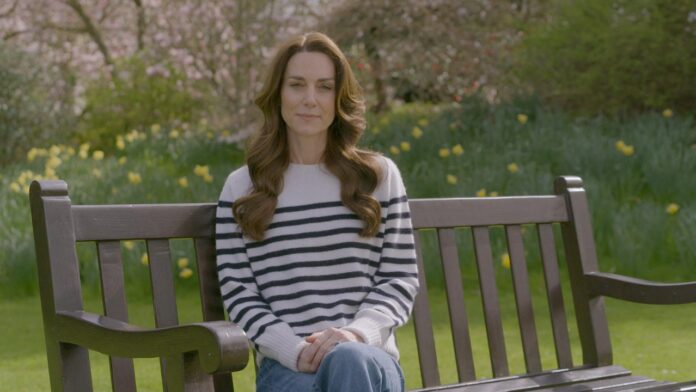There is no good way to break bad news, but some ways are more testing than others. Some people, whether from cowardice or an excess of bravery, refuse to break it even to themselves. The toughest of duties, it is widely agreed, has to be the delivery of dark tidings to loved ones, but, in the wake of a statement made by Catherine, Princess of Wales, on Friday, we can now think of something worse. Imagine having to share your bad news with millions of unknown onesâfascinated ones, prurient ones, pitying ones, or pitilessly mocking ones, none of whom you personally know, and all of whom either yearn or presume to know you, from the inside out. How do you begin to break such news without breaking up?
The statement was filmed outside, with Kate sitting on a bench, in uncertain sunshine, calmly disclosing to the camera that, having endured abdominal surgery, in January, she was now undergoing âpreventative chemotherapyâ for an unspecified cancer. âI am well and getting stronger every day,â she said: a bold assertion, as a multitude of viewers parsed every inch of her appearance. A host of golden daffodils, behind her, was a pledge of British springtimeâa natural chorus, as it were, to the invocation with which Kate signed off, asking that her fellow-sufferers âdo not lose faith or hope.â
That quiet decree could have been spoken by the late Queen Elizabeth II, who was well-versed in stoic fortitude. In other respects, what was remarkable about the Princess of Walesâs revelations was how unroyal they were. No titles were used. She referred to her husband as âWilliam,â and to their âyoung family.â No mention was made of King Charles, who is also being treated for cancer. The whole tenor of the statement was intended to establish an affinity between Kate and any other parent, anywhere, whose prime of life had just been invaded and upended by the bitterest of shocks. Whether this reaching out is a matter of instinct or design is not the point; some public figures have a talent for kinship, and some donât. Kate has it, as did Ronald Reagan, whose letter of 1994 began, âI have recently been told that I am one of the millions of Americans who will be afflicted with Alzheimerâs Disease.â This is about me, yes, but itâs not about me alone.
Evidently, we have come quite a way since 1951, when it wasnât just the British public that was left uninformed about the plight of King George VI, who had lung cancer. Allegedly, even he was in the dark. To claim that relations between the British Royal Family and the wider world are now bathed in a clear light of transparency and honesty, however, would be a stretch. If anything, we have simply traded one darkness for another: the old cloud of unknowing has made way for a roiling murk of misinformation and surmise. When Kate was admitted to hospital in January, those who responded with a sympathetic murmur of âThat sounds wretched. Get well soon,â betrayed their laughable innocence. The collective cry, in print media and especially online, struck a more ravening note, as if to say, âWhat are we not being told? Be warned: if you donât tell us the truth, weâll have no alternative but to make it up.â
That demand was sharpened by a failed attempt to meet it, on March 10thâMotherâs Day, in Britainâin the genial shape of a photograph of Kate and her three children. The image, it was soon discovered, had been edited; every pixel was then examined for manipulation and possible mendacity. A gap opened up between the real and the contrived, and outlandish theories rushed in to fill the space. When William and Kate had the audacity to visit a farm store, in Windsor, and the misfortune to be filmed in the act, the visual testimony was swiftly picked apart. Social media buzzed and writhed with talk of doppelgängers. The most balanced comment came on the front page of Britainâs Daily Star, where the headline read: âWorld Goes Mad After Woman Goes Shopping.â The lost era of George VI suddenly felt like a haven: stiff, maybe, but safe.
Is that why Kate, William, and their advisers took the decision to have her issue the most recent statement? Did they think, Enough is enough? If so, one cannot blame them. However shielded from the storm Kate and Williamâs children are, it canât be easy for them to fend off the realization that their mother stands at the very eye of global gossipâat the mercy of a raging meme, indeed, that insists that the role of their mother is being played by someone else. (Spare a thought for William, too: the motherless king-to-be, who continues to perform his royal functions while both his wife and his father are being treated for cancer.) Logically, the only cure for such lunacy was to show the Princess of Wales alive and well, or as well as she can hope to be, given her ordeal. Whether such logic, and such a tranquil plea for moral decency, will lay the rumors to rest, and shame the rancorous, is open to question. Feed the beast, and it comes back hungry for more. â¦


